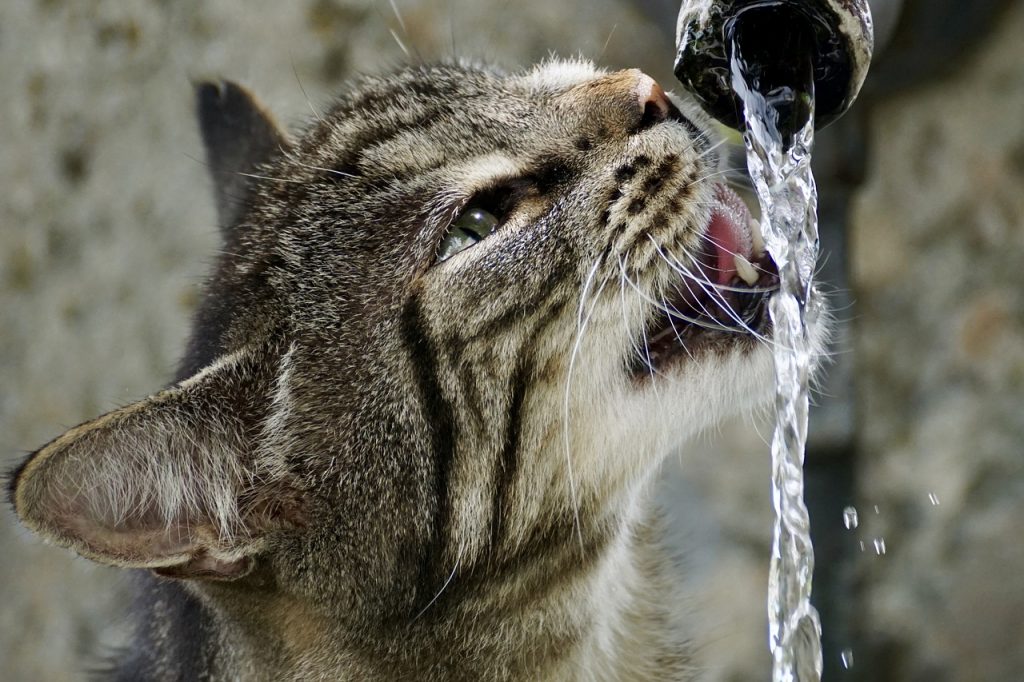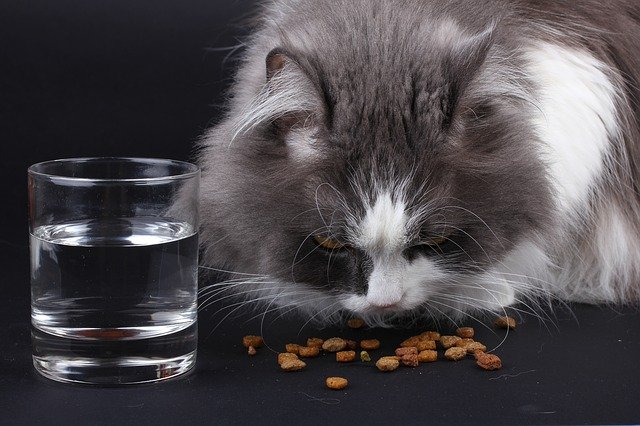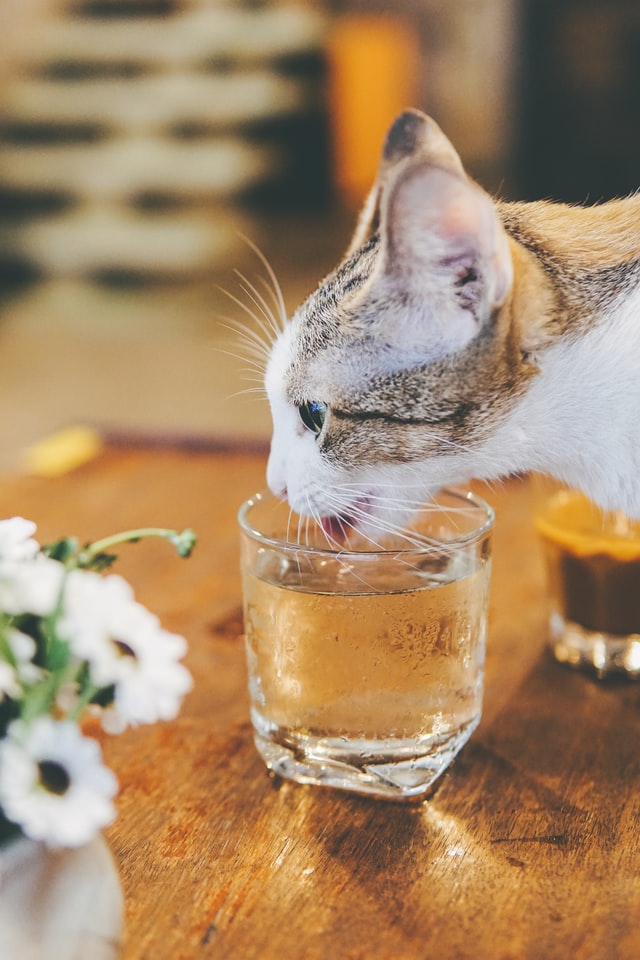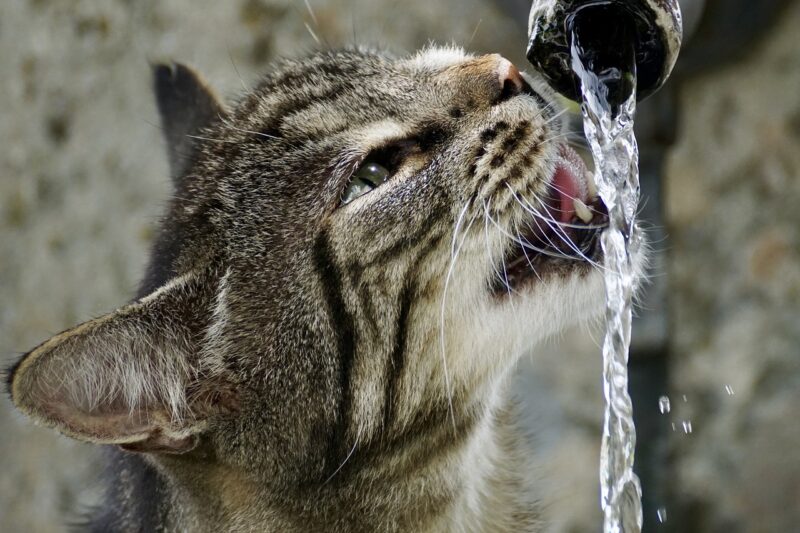Dehydration occurs when there is an excessive amount of fluid loss from the body. A lot of dehydration can be a very serious medical concern as the body needs water to perform its most vital functions.
Water is needed to replace the excess waste from bodies. In addition, water is needed for optimal digestion and blood circulation in the body.
Dehydration can cause serious medical problems, like kidney issues, heart problems, digestive issues, etc. A cat that does not drink water can only survive for three to four days.
You might think that your cat is getting dehydrated because it is not drinking enough water, but there can be other reasons for that. Dehydration can be caused by excessive fluid loss through vomiting or diarrhea.
In addition to that, hot weather, medical conditions like diabetes, kidney diseases can also cause dehydration in cats.
Compared to other animals, domesticated cats are more prone to getting dehydrated; this is due to the lack of urge to drink much water.
Cats in the wild get most of their hydration needs fulfilled from their prey, but domesticated cats usually do not get the proper hydration from their foods.
So, now that you understand how dehydration can negatively affect a cat’s well-being, it is important to be able to properly identify if your cat is dehydrated or not. Let’s examine how we can identify dehydration in cats.
Cat dehydration symptoms: What to look out for
There are quite a few symptoms of dehydration in cats. A dehydrated cat will have less energy, they will have sunken eyes, and their gums will be visibly dry.
Let’s take a look at dehydration symptoms in more detail.
Check Your Cat’s Eyes
Dehydrated cats have dull-looking eyes as compared to healthy cats. If you notice that your cat’s eyes appear to be sunken or just look a little lazier than usual, then there are chances that your cat may be getting dehydrated.
Dry Gums
This is one of the easiest ways to identify if your cat is suffering from dehydration. Cats that are dehydrated will have very dry gums, and you will easily be able to notice this symptom just by opening your cat’s mouth.
Lethargy
Dehydration can cause a cat to get lethargic; you will notice that your cat will not be nearly as energetic while doing its daily activities. Cats can get lethargic due to other reasons, too, so you should not rely entirely on this symptom alone to identify if your cat is dehydrated or not.
Check your cat’s skin
A popular test to check for dehydration in cats is called “Skin Tenting.” In this test, you take a portion of your cat’s skin and gently pull it around their shoulders. Once you have the skin around the shoulder, let go and observe how the skin reacts.
The skin on a well-hydrated cat will get back into place quickly, whereas the reaction is different for dehydrated cats. For a dehydrated cat, the skin will fall down slower, and if it does not fall down at all, then that could be an indicator of extreme dehydration.
What can I do to help a dehydrated cat?
If you believe that your cat is suffering from dehydration, then you should immediately take your cat to the vet. Dehydration is usually an indicator of a serious medical condition such as diabetes, fever, overheating, etc.

As we discussed before, cats do not really like to drink a lot of water. In the wild, they get their hydration needs fulfilled by eating the flesh of their prey. Domesticated cats usually don’t get as much water from their food, so there is a risk of them being more prone to dehydration.
However, there are some steps you can take to encourage your cat to drink more water. Let’s take a look at each of them.
Keep in mind that these methods are not necessarily a cure for dehydration. To identify the actual reason behind why your cat is getting dehydrated, you will need to visit a vet to get a proper checkup.
Adding broth to your cat’s water
Cats love the smell of chicken and other meats; in order to incentivize your cat to drink more water, you can just add a bit of chicken broth or Tuna water to make the smell more appetizing for your cat.
By doing this, you will increase the chances of your cat actually taking a sip from its water container instead of just ignoring it.
Another way to encourage your cat to drink more water is to change its water container. Some cats will not drink water at all from regular containers but love to drink from cat fountains.
Changing up your cat’s food
A lot of cat owners like to give dry food to their cats. This is because dry food is easier to store and clean up. Of course, once you notice that your cat is dehydrated, you should immediately switch over to wet food.
This will ensure that your cat is getting hydration from its food instead of having to exchange more of their body’s water to process the dry food that they eat.

Needless to say, dry food should be the first thing to go from your cat’s diet once you notice that your pet is dehydrated.
Depending on the severity of your cat’s dehydration, these changes can be enough to get them back into shape; however, for more serious cases, your vet may recommend some medical procedures to ensure that your cat can recover.
Find out also :
Human foods your cat should avoid
Can I feed my cats cheese?
Treatment for dehydration in cats
The quickest procedure involves giving fluids to the cat via injection. In other cases, your vet may recommend injecting the fluids directly into the cat’s vein.
Usually, it takes only a few hours or a day to rehydrate your cat, and they can be discharged from the vet.
In addition to rehydrating your cat, the vet will also take some tests to identify the underlying causes of the dehydration. Usually, dehydration is caused as a result of some illness that the cat is suffering from.
In order to completely cure your cat, it is important that the vet treats the possible medical condition that the cat is suffering from.
There are a few major illnesses that cause dehydration in cats. Let’s look at them in detail.
Diabetes
Diabetes is one of the most dangerous causes of diabetes in cats. This is because the illness is not immediately obvious to an observer. A cat suffering from diabetes loses a lot of water through urination as its kidneys are unable to filter the excess glucose in its body.
Fever
This is also another major cause of dehydration in cats. A cat that is suffering from a fever will not move around at all and do not drink water or eat any food.
In addition to that, their heart rate and breathing rate go up, which increases the consumption of water in their system. As they do not drink any water due to their illness, they tend to get dehydrated quickly as a result of that.
Excessive vomiting
Cats tend to vomit quite a few things out of their mouths, but if they are vomiting food and water too often, then they get dehydrated really quickly as a result of that. Excessive vomiting is caused due to an underlying illness in your cat, and you should see a vet if you notice your cat vomiting too often.
Are some cats more prone to dehydration?
There are a few factors that can influence if a cat gets dehydrated or not. We can divide the causes of dehydration into two major categories, namely, age and diet.
Let’s look at each of them in more detail.
Age
As dehydration is usually caused due to an underlying illness, it is perhaps not surprising to discover that some cats are more prone to dehydration as compared to others.
Generally speaking, older cats are more prone to dehydration as they are likely to be suffering
from other illnesses like diabetes, kidney disorders, and other digestive issues.
In addition to that, older cats usually do not like to drink a lot of water or eat a lot of food, so their intake of essential nutrients is also lower as compared to younger cats.
Diet
Diet is also a major factor that influences dehydration in cats. As we discussed before, cats do not like to drink a lot of water by themselves but instead rely on their food intake for their hydration as well.
This means that a cat that eats dry cat food and does not drink enough water will be more likely to get dehydrated as compared to a cat that gets enough hydration through its diet.

This is why you should make sure that you switch up your cat’s diet from time to time. You should try to feed both wet and dry cat food to your kitty from time to time so that they get a good mix of nutrients from their diet.
How much water does my cat really need?
You might be curious about how much water a cat actually needs daily to stay properly hydrated. Well, the answer depends on your specific cat.
Cats need about 3.5–4.5 Oz. of water per 5 lbs. of body weight. A 15 lbs. cat would need to drink around 10 Oz. of water daily to stay properly hydrated.
This also changes depending on the type of cat food you give to your cat. If your cat primarily eats wet cat food, then they will not need to drink as much water as they can get hydrated from their food.
On the other hand, cats that eat dry cat food will need to drink more water as they will not get any hydration from their food at all.
This is why it is recommended to switch your cat from dry cat food to wet cat food if you notice that your cat is dehydrated. Wet cat food is mostly made up of water, so your cat gets to fulfill its daily water intake by eating food and just drinking a little bit of water.
How can I encourage my cat to drink more water?
If you notice that your cat does not drink enough water, you can encourage them to drink more water by making a few changes. You can add a bit of chicken broth to the water of your cat so that they will be encouraged to drink more of it.
Furthermore, you can experiment with different methods to give your cat water.
Some cats will not drink water out of a regular container but will happily drink from a cat fountain.
Find out also reasons why your cat refuses to eat or drink
Final Thought
Cats can suffer from dehydration just like humans, and it is much harder to identify when they are dehydrated.
Like all living beings, cats need water to carry out essential body functions and can last only a few days without water.
There are a few major symptoms of dehydration you need to look out for in cats.
You will need to observe the eyes of your cat. Dehydrated cats have sunken/lazy eyes, which are very noticeable. In addition to that, dehydrated cats have very dry gums. This is a major sign of dehydration in cats and is one of the most telltale signs. Another method to check for dehydration is via “Skin tenting.”
Cats that are suffering from diabetes need to be taken to the vet immediately as there is often an underlying illness that causes dehydration. At home, you can help your cat recover by adding chicken broth or tuna fish juice to their water to make them drink more. You can also change up your cat’s diet from a dry food-based diet to a wet food-based diet to ensure that your cat gets enough hydration.
However, only a vet can properly diagnose and provide a treatment plan for a dehydrated cat, so you should get your kitty checked ASAP.
References and Further Reading
- Studies in Water Metabolism of the Cat. The Influence of Dehydration on Blood Concentration, Thermoregulation, Respiratory Exchange, and Metabolic-Water Production
- Mild dehydration, vasopressin and the kidney: animal and human studies
- Tolerance to heat and dehydration in several species of mammals
- 2014 AAHA weight management guidelines for dogs and cats
